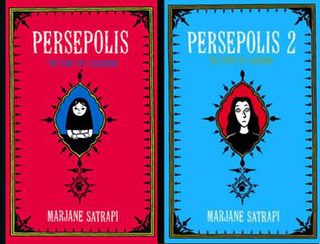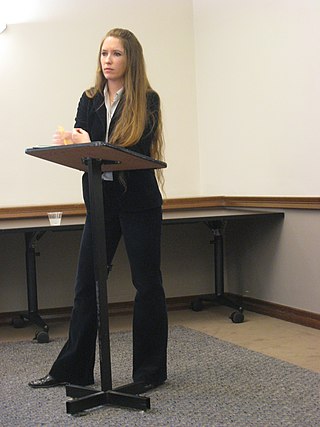
Mark Z. Danielewski is an American fiction author. He is most widely known for his debut novel House of Leaves (2000), which won the New York Public Library's Young Lions Fiction Award. His second novel, Only Revolutions (2006), was nominated for the National Book Award.
Random House is an American book publisher and the largest general-interest paperback publisher in the world. It has several independently managed subsidiaries around the world. It is part of Penguin Random House, which is owned by German media conglomerate Bertelsmann.

Julius Knipl, Real Estate Photographer was a weekly comic strip written and drawn by Ben Katchor from 1988 to 1998. It was first published in The New York Press and subsequently self-syndicated to various alternative weekly newspapers including The Washington DC City Paper,Chicago NewCity,Philadelphia City Paper,San Francisco Weekly,The Forward (English-language),The Village Voice and others.

Itzhak Avraham ben Zeev Spiegelman, professionally known as Art Spiegelman, is an American cartoonist, editor, and comics advocate best known for his graphic novel Maus. His work as co-editor on the comics magazines Arcade and Raw has been influential, and from 1992 he spent a decade as contributing artist for The New Yorker. He is married to designer and editor Françoise Mouly, and is the father of writer Nadja Spiegelman. In September 2022, the National Book Foundation announced that he would receive the Medal for Distinguished Contribution to American Letters.

Alternative comics or independent comics cover a range of American comics that have appeared since the 1980s, following the underground comix movement of the late 1960s and early 1970s. Alternative comics present an alternative to mainstream superhero comics which in the past have dominated the American comic book industry. Alternative comic books span a wide range of genres, artistic styles, and subjects.

Marjane Satrapi is a French-Iranian graphic novelist, cartoonist, illustrator, film director, and children's book author. Her best-known works include the graphic novel Persepolis and its film adaptation, the graphic novel Chicken with Plums, "Woman, Life, Freedom" and the Marie Curie biopic Radioactive.
André Schiffrin was a French-American author, publisher and socialist.

Hutchinson was a British publishing firm which operated from 1887 until 1985, when it underwent several mergers. It is currently an imprint which is ultimately owned by Bertelsmann, the German publishing conglomerate.

Raw was a comics anthology edited by Art Spiegelman and Françoise Mouly and published in the United States by Mouly from 1980 to 1991. It was a flagship publication of the 1980s alternative comics movement, serving as a more intellectual counterpoint to Robert Crumb's visceral Weirdo, which followed squarely in the underground tradition of Zap and Arcade. Along with the more genre-oriented Heavy Metal it was also one of the main venues for European comics in the United States in its day.

Persepolis is an autobiographical series of bandes dessinées by Marjane Satrapi that depict her childhood up to her early adult years in Iran and Austria during and after the Islamic Revolution. The title Persepolis is a reference to the ancient capital of the Persian Empire. Originally published in French, the graphic memoir has been translated to many other languages, including English, Basque, Spanish, Catalan, Romanian, Portuguese, Italian, Greek, Swedish, Finnish, Georgian, Kazakh, Dutch, and Chinese. As of 2018, it has sold more than 2 million copies worldwide.

Bantam Books is an American publishing house owned entirely by parent company Random House, a subsidiary of Penguin Random House; it is an imprint of the Random House Publishing Group. It was formed in 1945 by Walter B. Pitkin Jr., Sidney B. Kramer, and Ian and Betty Ballantine, with funding from Grosset & Dunlap and Curtis Publishing Company. It has since been purchased several times by companies including National General, Carl Lindner's American Financial and, most recently, Bertelsmann, which in 1986 purchased what had grown to become the Bantam Doubleday Dell publishing group. Bertelsmann purchased Random House in 1998, and in 1999 merged the Bantam and Dell imprints to become the Bantam Dell publishing imprint. In 2010, the Bantam Dell division was consolidated with Ballantine Books to form the Ballantine Bantam Dell group within Random House. By no later than February 2015, Bantam Books had re-emerged as a stand-alone imprint within Random House; as of 2023, it continues to publish as the Bantam imprint, again grouped in a renamed Ballantine division within Random House.

Chicken with Plums is a 2004 graphic novel by Iranian author Marjane Satrapi.

The Narrative Corpse is a chain story, or comic jam, created by 69 all-star cartoonists in the early-to-mid 1990s. A graphic novel compilation of the result was published in 1995.
For Beginners LLC is a publishing company based in Danbury, Connecticut, that publishes the For Beginners graphic nonfiction series of documentary comic books on complex topics, covering an array of subjects on the college level. Meant to appeal to students and “non-readers,” as well as people who wish to broaden their knowledge without attending a university, the series has sold more than a million copies.

The Cardboard Valise is a graphic novel by American cartoonist Ben Katchor. Published by Pantheon Books in 2011, it brought Katchor the National Cartoonists Society's Graphic Novel Award.

Penguin Random House LLC is an Anglo-American multinational conglomerate publishing company formed on July 1, 2013, with the merger of Penguin Group and Random House. Penguin Books was originally founded in 1935 and Random House was founded in 1927. Along with Simon & Schuster, Hachette, HarperCollins and Macmillan Publishers, Penguin Random House is considered one of the 'Big Five' English language publishers.
The New Press is an independent non-profit public-interest book publisher established in 1992 by André Schiffrin and Diane Wachtell, publishing many books with a left-wing political viewpoint.

Hillary Chute is an American literary scholar and an expert on comics and graphic narratives. She is Distinguished Professor of English and Art + Design at Northeastern University. She was formerly associate professor in the Department of English at the University of Chicago and an associate faculty member of the University’s Department of Visual Arts, as well as a visiting professor at Harvard University. She was a Junior Fellow at the Harvard Society of Fellows from 2007 to 2010.
Raw Books & Graphics is an American publishing company specializing in comics and graphic novels. Operating since 1978, it is owned and operated by Françoise Mouly. The company first came to prominence publishing Raw magazine, co-edited by Mouly and her husband, cartoonist Art Spiegelman. In the 1980s the company published graphic novels, and with the formation of Raw Junior in 1999, branched into children's comics with Little Lit and Toon Books.
Dan Frank was an American editorial director at Pantheon Books.














